#so weird and uncomfortable
Explore tagged Tumblr posts
Text
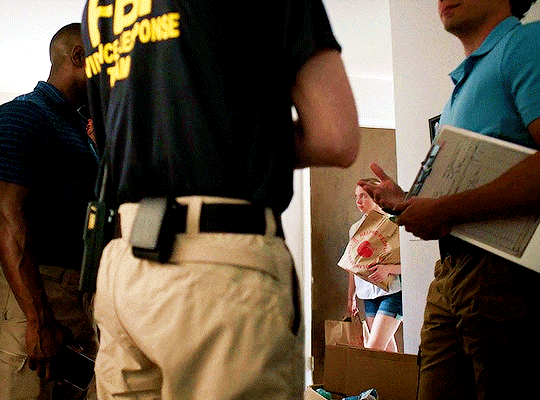
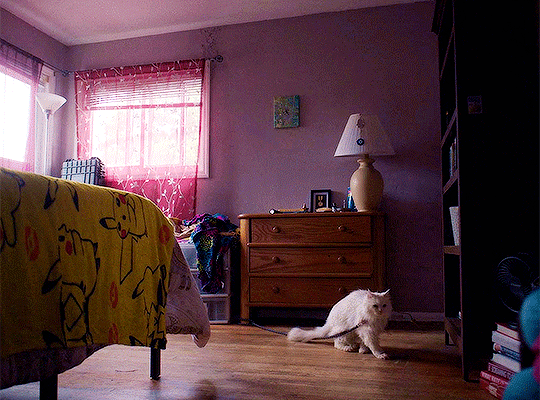

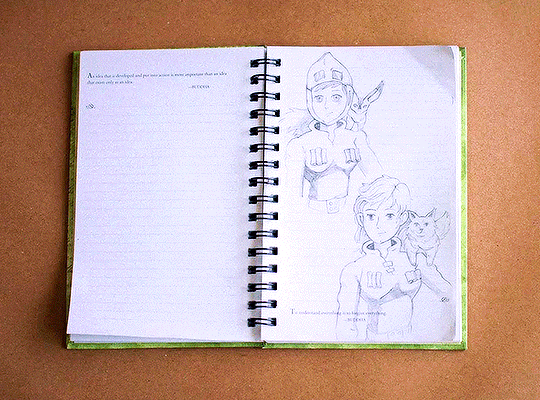

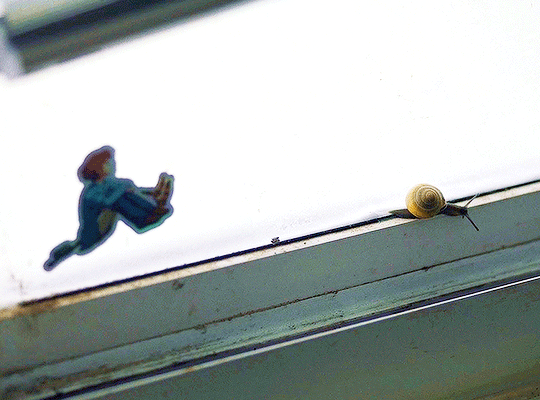

REALITY (2023) dir. Tina Satter
#reality 2023#reality film#reality winner#sydney sweeney#filmedit#sydneysweeneyedit#my gif5#so weird and uncomfortable#i cried! enjoyed it.#and absolutely obsessed with that closing music
130 notes
·
View notes
Text
It is no hardship, Emmrich tells himself, to wear his face. It is his, after all. The one he was born with, the one that grew and shifted under his own patient gaze, seen in puddles, in mirrors, in the glass of a carriage window as he smoothed down his hair with the flat of his palm. A face he had stared at for far too long that first time he shaved, and again a few years later when he invited that very pretty boy out for a promenade and wanted, with all the force of a young man’s vanity, to be just as pretty himself—no hair astray, the kohl at his lower lids an almost imperceptible shadow, the perfume at his neck a whisper of carelessness, though in truth, nothing had ever been more deliberate.
For a decade now, they have called him distinguished. Before that, they called him handsome. He knows his face, likes his face. Its summoning should be no trouble at all; especially now, especially like this, stripped down to something more elemental, all ivory angles and nothing more. But Rook is uneasy. She does not say so—she is all sorry, shit, don’t mind me, fuck, fuck, I’ll get used to it, I’ll get used to it—but she is not made for the sight of bone in the dark when she wakes abruptly. He has had years to come to terms with the unmaking of his flesh. She has not.
So he does not miss his face, not really. But Rook does. And for Rook, he will pretend.
No, he tells himself again, he does not mind. He does not.
Lichdom, as he had once explained to her, sanded down most of his senses. Blunted them, rubbed them smooth. But in their place, others have surfaced. Senses without names, without proper edges, ones that slip through language like smoke through a cracked door. He cannot smell the perfume she wears, though he knows it is dreadful, some sticky, saccharine thing she bought in Treviso with Lucanis and spilled all over her shirt. But he can see her pleasure when she presses a little figurine into his palm, triumphant and insistent. This one, she affirms, is so much prettier than the first, and most importantly, not haunted.
He watches her giddiness churn inside her, thick and writhing. It is purple, inexplicably. It loops and knots, wriggling sideways, swelling through her veins, a restless thing. It coils, slippery, around her heart before pouring from her mouth when she speaks. When she presses her lips to what passes for his cheek, he thinks he can taste it. Or something like tasting. As if she had chewed it to a pulp, crushed it between her molars, worked it down to something fibrous and wet and pressed it into him, like carrion slipped between teeth, offered as a gift.
He swallows it, slow.
Perhaps this is what purple has always tasted like.
There are other things. Other feelings. They arrive misshapen, crawling over the edges of his thoughts, curious, pestering, impossible to ignore. They perplex him. They amuse him. And sometimes—sometimes—he wishes he felt nothing at all.
Like when she cuts herself, and he watches the blood spill, a slow, indifferent line along the curve of her arm. But it is not blood, not in the dull, medical sense. Not something as pedestrian as iron and salt. It is a ribbon, impossibly red, and he can see the rest of it coiled inside her, packed neatly away, waiting to be tugged. How much could he pull free before she wavers, before her lips lose their color, before the bright, stubborn thing inside her gutters out?
He heals her arm. Does not look at her when he does it. Says nothing of consequence.
But he wants to take that ribbon and wind it around her wrist, knot it, twist it, pull it so tight that it ceases to be a ribbon at all. Flesh yielding to pressure, pressure forcing permanence. A bracelet of skin. A smooth, bloodless seam. A correction.
Rook thanks him. A glance, a nod—already half-gone as she turns toward Rivain. There are things to be done there for her, and he cannot stray from the Necropolis for long. What things, exactly, she does not say, but he knows their shape well enough: dragons, impulse, the peculiar magnetism of disaster. She has always been like this, drawn to the spectacularly unwise with the certainty of a moth misjudging distance.
He can no longer follow.
She will return. He knows this. And yet, if his hands still possessed the capacity for tremor, he suspects they would betray him now.
"I love you, I love you, I love you," she sings, a careless, looping refrain, a child’s chant repurposed for a woman who has never quite learned to tread lightly. She chatters as she moves; this and that, something or other, a bad decision or three. She shows him rings, delicate and stolen, lifted from a dragon’s hoard, then tells him of a strange mug found in the same place and promptly lost to someone forgettable in a game of cards.
"Look, look," she says, because excitement makes her redundant. "I kept these for you."
The rings slide onto his fingers—bandaged, skeletal, indifferent to the distinction. He flexes them. Smiles, because each one carries an emerald, and green has always pleased him.
"I was meaning to ask you," Rook says. She is still holding his hand, turning it gently in her own, left, right, right, left, as though testing whether it is truly there. "You are smiling now."
"I am."
"Don’t interrupt me."
"My deepest apologies."
"It was a joke," she says, but absently, without weight. Then, again, softer: "You are smiling now. But is it real? Or do I see a smile only because I expect to? Because I believe it should be there?"
"It is quite real," he reassures her, lifting his free hand, brushing two fingers against her cheek. "The glamour does not fabricate emotions. It is a projection, not an invention. A polished pane of glass through which I am seen, rather than a mask obscuring what lies beneath. It filters nothing. It simply allows you to perceive what is still there, as it was."
She exhales. He watches it unfurl from her mouth, a slip of breath that curls, dissipates, wrapped in green. Relief, perhaps.
"Good," she murmurs. "That is good."
There are things he misses more than others. Some he had not expected to mourn, believing that lichdom would cauterize the want before it could take shape. And perhaps it would have, if not for Rook. But she exists, unavoidably, and so the loss takes shape, outlines itself, defines itself against the hollow places she touches.
The intimacy of the body: its mechanics, its heat, its crude and glorious simplicity. He misses the way skin clings, damp and sticky, the tack of sweat drying between them. The way lips grow chapped from too much kissing, saliva sapped away until the skin cracks, until the next kiss stings. He misses the raw and graceless rhythm of it, the press of her thighs around him, the slow loss of self in the churn of it all. He misses the way he could press his palm to her stomach, still sheathed within her, and feel himself there, caged by her.
And afterward, in the languid sprawl of spent nerves and loose limbs, the way his mind would wander, taking him by the hand, showing him its little fantasies, its secreted-away indulgences—let us get married, Rook, I will buy you so much gold, let’s get married, yes, and then let’s have a child, but not immediately, not at once, let’s linger here a while, let’s lose ourselves in this, let’s glut ourselves on one another until we are utterly ruined by it, and then, yes, then, we will have that little thing.
Now, he feels her differently. Not through skin but through something more fundamental, a closeness that eclipses anything flesh ever allowed. It is fuller, sharper, deeper than anything he could have imagined.
But it is not the same.
And he does not yet know if he prefers it.
Time, as always, will decide.
Pleasure has not abandoned him. It has only changed its nature, its source, its means of arrival. Now, it exists solely through her. He sees, now, how men dissolve into drink, into smoke, into whatever tincture delivers them to sensation. The body remembers its peaks; the body conspires to reach them again.
"Will you come for me, darling girl?" he murmurs against her ear, his fingers curling inside her as they have done so many times before—when his hands were warm, when they ceased to be.
And she does what she always does: she writhes, she gasps, she laughs, she moves against him with the helpless, thoughtless grace of something yielding to gravity. Her hips chase the friction, her mouth parts, her breath hitches, her lashes lower, heavy with pleasure. And he—he is there inside her, feeling it as she feels it, tasting it in a way that has nothing to do with taste, swallowing it down, letting it course through him. It is vast. It is staggering. Pleasure enough for two, for more than two, enough to fill the space where he no longer exists.
Afterward, she is breathless, boneless, staring up at the ceiling and laughing that strange, impossible laugh. He no longer tries to make sense of it. Some things cannot be translated. She has a laugh for anger, a laugh for excitement, a laugh for surprise. He thinks he knows this one well enough by now, the one that trickles out of her in the aftermath.
A trick, an echo, the imitation of a thing once real. He kisses her where he would have kissed her once—her mouth, the sharp ridge of her collarbone, the small curve of her breast, except now there is no heat, no wet drag of a tongue, no parted lips. Only the careful architecture of a spell, a memory sculpted into sensation, something just close enough to pass for real. He trails lower, following the old pathways, the ones his hands remember even if they are no longer the same.
She sighs. Again. Again. Another time.
He lingers where she yields the most, where she is all pulse and warmth, where her thighs, slick and trembling, part for him before he even touches her. Where breath quickens and thought slips away. And through it, he drinks. Draws from her as he always does, as he must, in ways he does not fully understand, or perhaps does, but has decided against understanding. He takes until she is weightless, drifting, until her voice emerges in that low, drowsy enough, enough, until she exhales, unconscious of herself, shifting, turning into him, her cheek settling against his shoulder, her body already gone to sleep.
And he wonders—if he did not stop, could he empty her?
What is it that they share, exactly? What does she give? What does he take? Is it taking at all? Perhaps she is feeding from him just as he feeds from her.
He could ask. He could go looking for the answer. It is what he has done his entire life.
But he does not. Because the answer, whatever it may be, does not matter. Because, at his core, he knows this much to be true:
He is an empty thing now.
And all empty things must be filled.
It is a dreadful experience, watching her get hurt. Dreadful in its predictability, in the casual inevitability of it. Rook, as he has come to understand, is the sort of person who leaps from a cliff first and wonders, mid-air, whether there was perhaps a gentler way down.
He saw it in Hossberg—how she, in some fit of blind fury over a slight he can no longer remember, kicked a blight boil with all the grace of a petulant child, only for the thing to rupture, spraying its filth over her boots, her legs, her hands, her face. Later, when he spat out his anger—you could have infected yourself, and then what? Where would the Veilguard be without their leader?—she had, without hesitation, lifted her middle finger and held it aloft, like a banner, like a flag planted firmly into the dirt, a gesture so profoundly Rook that it settled the argument before it could begin.
She returns from Rivain with a sprained wrist and, predictably, does not acknowledge it until he gestures toward it, a quiet inquiry rather than an accusation.
So he buys her things. Things with weight, with shimmer, with the ability to distract. A bottle of wine she favors, a dress the precise shade of blue that once made her pause in front of a shop window, jewelry that catches light and throws it back in a thousand fractured directions. Loud things, bright things, expensive things. The kind of things a magpie would die over. Because Rook—misnamed, mislabeled—is no rook at all, no solemn, shrewd thing perching in the rafters. She is a magpie, ever in pursuit of the next gleaming fragment, the brightest piece of a broken world. That is why she is away, isn’t it? Always away. Always chasing.
But Nevarra has more gold than the Rivaini coast.
He wants to say—won’t you stay? Won’t you, at last, stay longer? But there is something perilous in the asking. The wrong phrasing, the wrong weight to his voice, and she will fold up like a map, unreadable, distant, already turning toward the door.
She lifts a necklace, lets it spill through her fingers, a thin chain pooling in her palm. "Ooooh," she hums. "What’s the occasion?"
"I have missed you terribly," he says. "You were away too long."
"I missed you too."
"Then stay. My townhouse is yours, of course. It is in the heart of the city—"
"But you won’t be there," she interrupts, without sharpness, without accusation. A simple statement of fact. "You’ll be in the Necropolis."
"Then stay with me in the Necropolis," he says, more softly.
She looks at him. Long enough for him to grow aware of the silence. Long enough for him to think he ought to say something more, to fill the space with some innocuous remark, something to break the weight of it—a comment on the weather, the slow drip of rain against the windowpanes, the scent of damp stone, the candlelight shifting across her cheek, the peeling corner of the wallpaper he has been meaning to mend but never does.
Then, at last, in a whisper, as if she is considering each word before releasing it:
"I'm trying."
A breath.
"I'm really, really trying. I love you so much. This frightens me, but I love you, and I'll stay longer, I promise, and you needn’t hide your face, no, no, you can stop hiding it now, but it is so terribly cold here, and I can smell the bones, Emmrich, did you know one can smell bones?"
Senseless, rambling little words, leaving her mouth with no regard for order, no real expectation of being understood. He listens anyway. He nods as if these words, specifically, are the ones he has been waiting to hear. He holds her hands, pressing his fingers lightly over hers, as though reacquainting himself with the shape of them, the bones beneath the skin. And this time—this time—she stays.
He does not move. Does not speak. Instead, he lets the moment settle around him, lets it press in from all sides, cautious and weightless, as if sudden motion might send it scattering. A trick of the mind, surely, nothing more than habit, the vestigial longing of a body that no longer exists. And yet—something, something faint and absurd and wholly impossible—something like warmth uncoils in the vacant spaces of him, and for the first time in too long, he allows himself to believe in the illusion.
And he is happy, so terribly, foolishly happy, until she steps where a step should have been, onto stone that no longer exists, because the Necropolis, fickle and treacherous as ever, decides to shift beneath her. One moment she is there, cursing the cold, flicking dust from her sleeve, and the next she is gone, swallowed into the dark, falling before he can reach for her. Then—impact, the sound of something snapping, something that should not snap.
"Oh, for fuck’s sake," she spits, voice sharp with pain, her frustration seething through clenched teeth. "I hate this fucking place. This miserable, shifting, plague-ridden, necrophiliac fucking mausoleum. This—" she swallows, gasps, rage momentarily overtaken by the white-hot shock of agony, then forces the words out, savage and breathless—"this godsdamned, dusty, corpse-stinking labyrinth of a tomb. Fuck this place. Fuck you for living in it. Fuck this floor for moving. Fuck my fucking leg."
She hisses even as she cries, squeezing her eyes shut as if trying to will the hurt out of her body. He sees, at last, what has happened. A break, and not a clean one: bone slick and white against torn skin, jutting through muscle, her blood already thickening where it pools on the stone.
And then—something strange. A pull, an unraveling, something unwinding before him, leading away. The ribbon again, unspooling, slipping from her, stretching outward, as though guiding him somewhere he does not wish to go. His vision narrows. He follows it. He follows it because he cannot help but follow it.
"Emmrich?" Her voice has changed. The heat is gone, as is the anger. She sounds uncertain now. She sounds concerned. "Emmrich, are you—?"
But he is looking at the ribbon. Watching where it leads. Watching where it ends.
And he would weep if he could.
He has spent his life in a state of want, always reaching, always grasping, always aching to be something necessary to someone. And now—now, at last—he has what he has longed for. Rook, quick and wild and untouchable. Rook, who was born lovely and careless and beautiful, who could have wrapped herself around anyone she pleased but chose, instead, him—old and grey, and then, simply, bone. Rook, with her hands always outstretched, her eyes always searching, who once told him, so offhandedly he almost believed she didn’t mean it, that she would have given him a child.
Now—now, she sits before him, cursing under her breath, her leg twisted, her blood sliding across the stone, and he understands, too suddenly, too clearly, that he cannot keep her.
One day, that ribbon will slip from her entirely.
And he will be wanting again, except this time, there will be no remedy, no second chance, no indulgence to dull the ache.
Because she—she—the only thing that has ever fit the hollow inside him, will be gone.
A year. Ten. Twenty. Perhaps less. Perhaps more.
She will be gone.
Gone, gone, gone.
"It will not break again," he tells her.
"Really?" she asks, pale from hurt.
"Truly."
He stands, glances over the chamber, and selects a sconce, its veilfire guttering weakly within its iron frame. He snuffs it out with a flick of his wrist, wrenches the metal free from the wall, and lets it sag into liquid in his palm. The Necropolis will not miss it. It devours offerings every day; what is one more? The molten iron shifts, pulses, rolls like living mercury as he shapes it between his fingers. She watches, suspicious, wary, but when he takes the pain from her, she sighs, slackens, her body a thing that yields, a thing that trusts.
Bone is simple. A structure, a framework. Break it, mend it, break it again. He has done this before, he will do it again, and the body always obeys in the end. With a slow push, he sets her leg back into place. Crack, crack, crack—shattered edges realign, splinters withdraw, raw ends fuse like wax pressed to wax. He sees the place where the bone has chewed its way free, white and wet against the torn meat of her calf.
He presses his fingers into the wound, past the sealing skin. The iron above them stirs at his will, stretching like a cat in the air before obeying, flowing down, clinging to the surface of the bone. Not inside it, no. That would be crude, inelegant. Instead, it forms a layer, thin but solid, a second skeleton over the first. It cools as it settles, solidifies, binds itself to her as if it had always belonged there. He guides it lower, shaping it over her tibia, letting it follow the curve of her ankle, turning his wrist slightly to direct it sideways, until the fibula is covered as well, safe beneath its new armor. There.
The final shreds of her wound pull themselves shut, sealing over his work, concealing what has been done.
She shifts her foot, tilting her head, considering. "Oh," she says. "I suppose I'll be heavier now."
He kisses her cheek and feels the faint shift of muscle beneath his lips, the small, secret curve of her smile. This time, for once, her happiness has no color. Not gold, not red, not that strange, shimmering violet he sometimes sees curling from her ribs. Just happiness, unembellished, undisturbed. And because she feels it, he believes it, and because he believes it, he takes it for himself, drawing her close.
"I am so, so happy that you are safe," he hears himself say, a confession with no real shape, a drunken speech without the mercy of intoxication. "I worry when you are gone, and I worry when you are here. It seems that no matter what I do, something always finds you first."
She hums, arms looping around him, her fingers idly mapping the planes of his back, tracing aimless patterns into the fabric of his robes. "I don’t know what to say to that," she admits, her voice softened by exhaustion, by the slow retreat of pain. "But I am so, so happy with you too. And it’s all right, it’s all right. Every time I break, you can repair me." She pauses, then adds, utterly deadpan, "Guess that makes you my skele-tonic."
It is an objectively terrible pun.
"Until you stop breaking altogether," he murmurs.
Another hum, vague, thoughtless.
He draws from her as he always does: pleasure, warmth, something deeper, something without a name, though it must have one, must have been cataloged somewhere, written down by some scholar who spent his life studying things that could not be grasped. He has never fully understood what it is he takes, only that it belongs to her, and that, by some quiet, unspoken permission, it is his as well. He wants to love her forever. But more than that, he wants to ensure that forever remains within reach, that it does not remain, as so many things have, just outside his grasp, dissolving the moment he closes his fist.
He has spent too long watching what he yearned for unravel before he could fasten it down. This, he will not allow. It will take gold, it will take iron, it will take something far stronger, something absolute. Until she ceases to break. Until breaking is no longer a possibility, a concept, a word that has anything to do with her.
He does not yet know how. But he has time—too much of it. More than she does. And he has always been a man of precision, of hypothesis and proof, of elegant solutions to insufferable problems. He will find a way. Through metal or magic, through that ribbon of red that keeps slipping from her, unspooling itself in slow increments, always trying to get away. He will take it, force it back into place, stitch it to the marrow, fix it with something incorruptible, something permanent, something that cannot be unwound without unmaking her in the process.
He presses a kiss to her temple, then to her forehead, and speaks of flowers. The new blooms in the Memorial Gardens. Hideous, by all accounts. She will adore them. She appreciates beauty, certainly, but she loves foolishness even more. He kisses her cheek, the tip of her nose, her small, stubborn chin, and feels it again—that bright, quiet thing. Happiness.
And, miraculously, when he takes a piece for himself, it does not feel stolen.
"Enough, enough," she murmurs at last, the same word twice, as she always does when she needs a break from him, when she has given too much, when she feels him pulling, drinking, taking in excess without meaning to. Laughter ghosts beneath the words, thin but present, a reminder that she is still here, still whole. She taps his wrist with two fingers, light, quick, final—a gesture that, for all its carelessness, feels uncannily like closing a book.
#i can't sleep so i quickly edited this thing i wrote a while back so it's not as raw and am now throwing it out into the depths of tumblr#we don't condone lichdom in this house#there is no way emmrich would remain a sane human being as a lich if he romanced rook#frankly they should have given us the option to break up with him if he decided to go full lich#he is only gonna transfer his fear of death onto rook#and it will not be healthy#it will be weird and uncomfortable and maybe downright creepy#aight im gonna try to sleep now#emmrich volkarin#emmrich x rook#emmrook#rook x emmrich#lich emmrich#dragon age the veilguard#datv#shortstories#my stupid writing#< those last two are just my personal tags for finding my own shit if i need it btw lol ignore them
355 notes
·
View notes
Text




Bought the most expensive Pencil™ of my life to test out drawing on an iPad whilst I was on hols
#art#doodle#battle priest#so i won an ipad at a conference earlier this year and had no idea what to do with it lol#it's now my “temporary tablet” when i'm away#and want to do art but im not away long enough to bring my actual wacom#speaking of which drawing directly on a screen is so weird im still an Intuos5 type of person XD#and the lack of keyboard shortcuts got some taking used to#sketchbook is a pretty neat free app tho#i was gonna try and use Fresco but i immediately uninstalled it once i realised you could ONLY save things to the cloud in it#side note the slight tilt to the yellow bar in Rire's pic irks me but i literally did that on purpose to make ppl uncomfortable/aggravated#SO GOOD TO KNOW IT'S WORKING I GUESS XD#sz
541 notes
·
View notes
Text
wincest fanon will never be able to compete with the canon, i was just casually watching supernatural when sam was like "hey dean what if we turned each other into frankenstein's monsters so that we could be together forever we wouldn't even need to kill that many people probably please big brother please <3"
#this show is so so so weird#wincest makes me uncomfortable i dont ship it as in like it i ship it as in i think there's canonically. stuff.#wincest#weirdcest#samdean#gencest#supernatural#my post
678 notes
·
View notes
Text
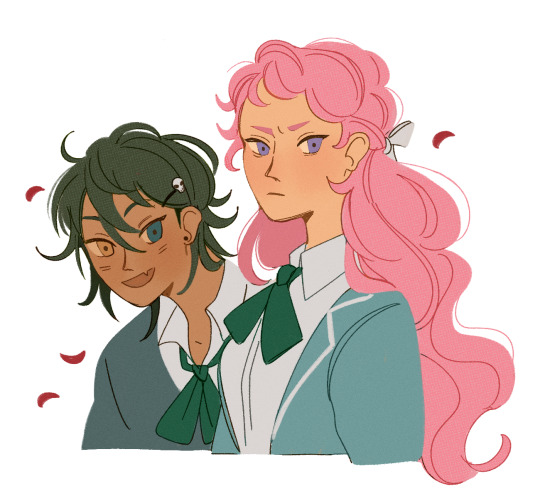
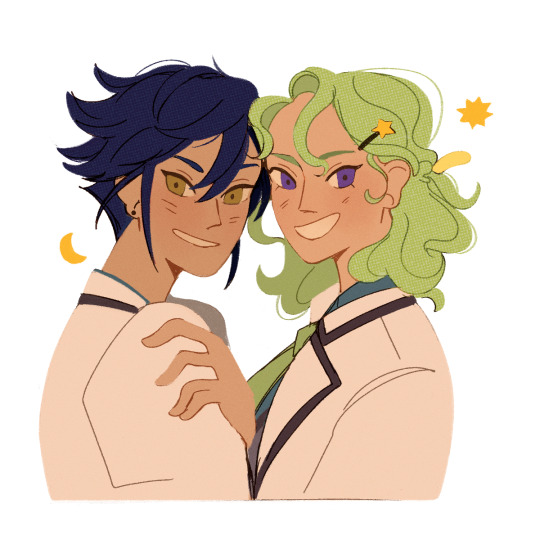
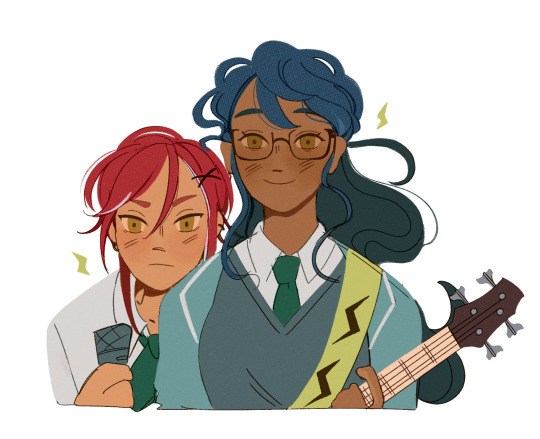
hits them with the yuri beam
#enstars#femstars#natsumugi#shumika#hiyojun#listen i still feel like 60% uncomfortable with genderbends as a trans person myself#but they're the exception because a) they're trans-coded to me anyways and b) they also hold yuri potential#i have my reasons it's what i'm saying so don't engage if you're gonna be weird abt it#anyway you can tell what types of ships i like huh#you can't take bassist mugi out of my dying hands if you even tried#doodles
978 notes
·
View notes
Text
Was skimming through some Dixon era BoP for no particular reason and came across a scene where 3 DIFFERENT MEN (Dick Grayson, Ted Kord and Jason Bard) all show up to Babs' door at almost exactly the same time bc they're all in love with her.
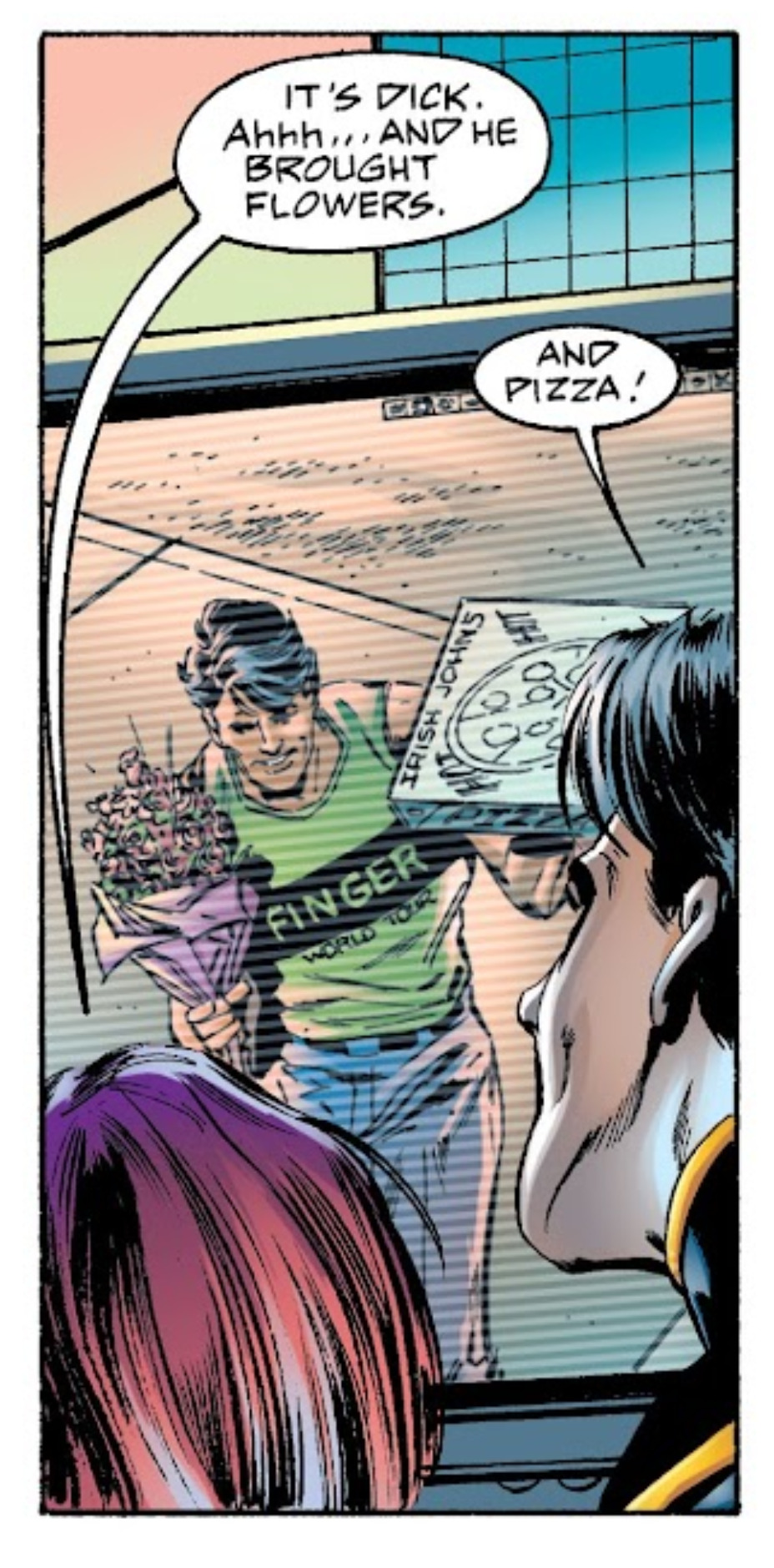
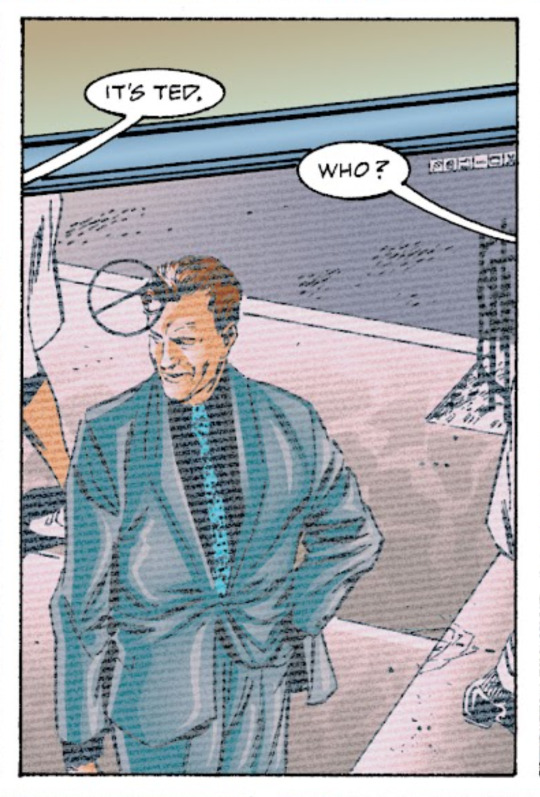
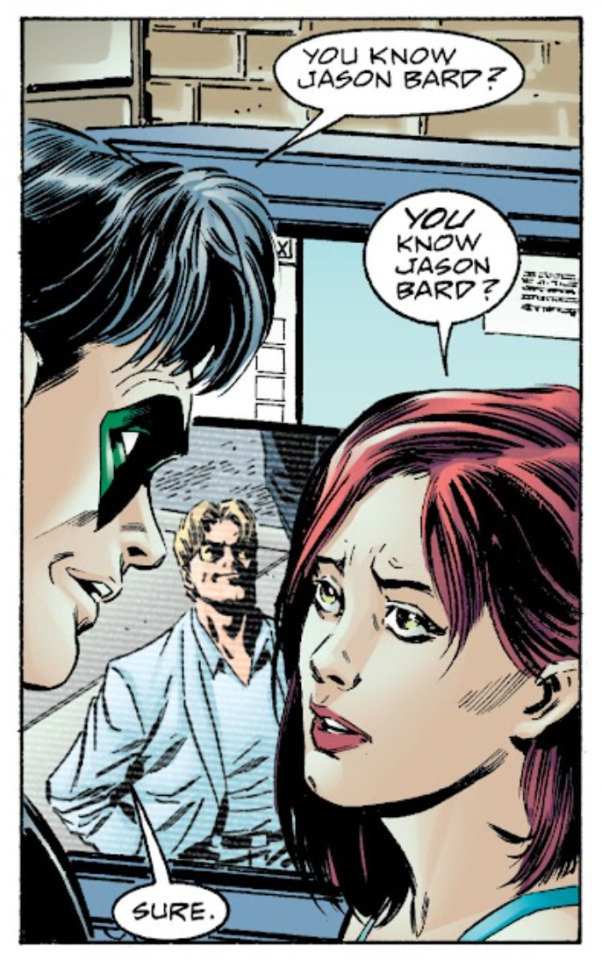
Birds of Prey (1999) #19
Which is, A) really funny on its own and B) actually extremely based from a representational view. Oracle was important as disability rep in comics for a lot of reasons, one of which being that she got mad bitches in her wheelchair. She had too much swag and they had to kill her
#ramblings of a lunatic#dc comics#dc#barbara gordon#dick grayson#ted kord#jason bard#normally I'd feel bad taggijg barely relevant characters but here i think it is feminism actually (/lh)#this is also not counting her Thing with Dinah. but also she's definitely having a thing with dinah (tho idk if at this point)#to me anyway#realizing i need to actually read all of bop from the start to fully understand babs' insane love life#also idk if this comes off as weird? like I'm not trying to imply babs is a cheater/player (i think it would be cool if she was. personally)#i just think it's funny she has all these men pining after her at this point in time#when later comics would try to convince you her peak desirability was as batgirl#like ik jason bard was a pre-crisis love interest for babs (I haven't read any of their relationship tho)#and so was dick. kinda (the age gap was WAYY bigger pre-crisis. like uncomfortably big actually)#so even that is like. 1.5 love interests basically. post crisis? you couldn't count the men lusting after babs on one hang#love that for her. get it girl!#i feel like this post is a sister post to my 'steph should get mad bitches' post. make of that what you will
187 notes
·
View notes
Text
Baldurs gate 3 is very funny in that it brings together a group of people who under most circumstances would consider themselves a found family but just so happens to have populated the group with soley people who would be vehemently against calling it that
#baldurs gate 3#bg3#the tadfools#karlach#wyll ravengard#astarion acunin#gale dekarios#Shadowheart#lae'zel#like ok karlach MAYBE MAYBE depending on how she feels about her dead parents#Astarion probably has that feeling but would never name it because constucting a family is very much wants cazador did#so hed feel really uncomfortable with it in concept#wyll lost cause unlessnyou can get him to recognise that ulder and florrick suck so lost cause#gale has like actual functional family#shart would have that be such a weird long process of synthaisis between the person take from her and the person she is#it would be very weird and messy and she probably wont bother#and Githyanki dont really have family as a concept so Lae'zel wouldn't use that as a frame of reference#i like to think they still kinda are#its the same emotion who just like with a desperate desire to never put that label on it#which fair
223 notes
·
View notes
Text
Watching tyler and josh interact actually heals something inside me
#i have a difficult time with receiving too much hmmm idk how to describe it#affection?#but i myself feel so fkin much affection especially toy friends#and i try to show it#but often i fear that i am being too much#that they might think i habe romantic motives instead of platonic ones#bc in my last friendship everyone thought i was in love with my former best friend#and i think he too thought that#even tho he knew i am aroace#i feel like he invalidated me?#weird things also happened and it made me even more uncomfortable#like the way how tyler and josh interact… its so sweet#its not awkward#ppl might think they have romantic feelings but to menthey just feel like platonic mutuals#understanding each other so much#being respectful of each other#supporting each other#i luv them#tyler joseph#josh dun#twenty one pilots
80 notes
·
View notes
Text
















Tuvok and Kathryn + Touch
Unknown, found on Pinterest // While You Were Sleeping - Heath // Voyager - Season 2, Episode 6 // Voyager - Season 7, Episode 25 // I Had a Dream About You - Richard Siken // Dreams of Clytemnestra - Dacia Marani // After Bombardment, Sonya - Ilya Kaminsky // A Pocket Full of Lies - Kirsten Beyer // City of Bones - Cassandra Clare // Voyager - Season 7, Episode 10 // Richard Siken //
#trek thoughts#yeah okay so they make me crazy#i am always thinking about their relationship#and the role touch plays in it is important to me#kathryn is in general a very touchy person#we see this with how she interacts with everyone in her crew and nothing about that changes with her relationship with tuvok#he rarely (if ever) initiates touch with her (when he does he's weird about it - like during twisted where he just moves his hand close)#but he never appears uncomfortable or surprised when kathryn touches him#their relationship is so intimate yet weirdly formal#also this can be taken as shipping or as platonic#mostly they are a qpr to me#web weaving#tuvok x janeway#Kathryn Janeway x Tuvok#tuvok#kathryn janeway#star trek#captain janeway#Star trek Voyager#voyager#voy#janeway#admiral janeway#captain kathryn janeway#star trek janeway#star trek voy#st tuvok
167 notes
·
View notes
Note
aaaaa can i request #44?!?
absolutely of course you can 🫶
[from this list of prompts]
[5. 'are you jealous' - 27. 'i'm pregnant' - 46. 'hey, have you seen...? oh']
44. 'if you die, i'm gonna kill you'
"Hey, hey," Anakin hears. Or feels, rather, as each word is punctuated by an ungentle tap against his cheek. Which is really sort of rude, considering that the last thing Anakin remembers is taking a grenade to the chest.
The least Vos can do is be nice to whatever's left of his dying body. He hopes the grumble of dissatisfaction he makes conveys this, because he can't find the energy to actually speak, let alone turn his head away from the hand on his face.
"No, nope, c'mon, Skywalker. Get up. Keep those eyes open. There you go. You're fine."
Anakin doesn't feel very fine. He feels disjointed and confused. He's in so much pain that it's honestly hard to focus on anything else, not even the blurry vision of Quinlan Vos' face leaning over him.
There'd been the grenade. So for all intents and purposes, Anakin should be dead, not dying. He'd been wearing armor, at least. Obi-Wan had given him his armor before sending him into the caves with Vos. He thinks. He remembers that, the way his master had taken Master Vos aside for a conversation that looked tense and unhappy, even to Anakin's eyes. And then his master had taken off the armor provided by the planet's guards--something heavier than what Anakin had, higher tech and sturdier--and given it to Anakin. It'd still been warm from Obi-Wan's body heat when he'd helped him fasten the straps around him.
His master. Anakin needs to--if there are grenades around, if the rebel group has access to that sort of fire power, if they're here in these caves with grenades while Anakin's master is walking about without armor--
"You're fine," Vos tells him, tugging once, sharply, on the padawan braid hanging down Anakin's throat. "Missing a bit of your side, but of your--your arm, but you're fine."
Anakin doesn't feel fine. Anakin has no idea how he feels. Anakin needs to find his master. He can't--
"Swear to the Force, Skywalker, if you die--I'm gonna kill you. Cause Obi-Wan's gonna kill me," Vos is muttering and Anakin can feel his hands ghosting along the site of the injury. It must not be good. He doesn't sound like it's good. He doesn't sound like Anakin's going to be fine.
But at the sound of Obi-Wan's name, Anakin forces his eyes open into slits once more. "'ll be fine," he tells Vos.
"Damn right you will," Vos replies, and suddenly his hands are tighter on Anakin, pressure being applied that lifts him up off the ground.
"No, not--" Anakin says, and he can hear the way he's slurring his words. He can hear the sound of his breath and the beating of his heart. "He'll be fin'."
It's easier to let his head flop down against his chest than to try and lift it to see where they're going. If they're moving somewhere, he trusts Master Vos enough to get them there, even though it's at least partially the man's fault that he went and got himself blown up. After all, he'd pushed Vos out of the way of the explosive the moment he felt it flying through the Force. So really, it's his fault.
He wonders if he should say that out loud. If Vos already thinks it, if it matters.
He doesn't think it matters, really.
"Oh, he'll be fine?" Vos asks, and Anakin's dropped--at least gently this time--against the wall of the tunnel as Vos pushes against a door with the Force. Checking for danger. Securing the area. "He'd be devastated, Skywalker."
"Get a new on'," Anakin disagrees, going limp the moment Vos' hands lift him up again. It hurts. It still hurts. And there's the dark promise of sleep licking at the back of his mind. It'd be so easy to fall into, if he could just stop arguing with Quinlan Vos. "Jus' a padawan."
Just a padawan, just an obligation. They've been butting heads more and more frequently ever since Anakin turned sixteen. That was a year ago now. Their quarters are silent usually, but tensely so. Anakin spends a lot of his time in places he's not supposed to be: the beds of other padawans, the Lower levels podracing, the occasional jail cell if he can't run fast enough. Obi-Wan, he thinks, spends a lot of time tired. Regretful. Unable to look at him, which rankles more so than the cuffs the Coruscanti cops have put on him to keep him subdued on the way to the jail.
If Anakin were to--if he--if this...if he doesn't make it out of these tunnels, Obi-Wan'll be alright. Eventually.
Except Obi-Wan needs his armor back. That's where they're going, Anakin's sure. He needs protection because it's dangerous down here and Obi-Wan gave his protection away, gave it to Anakin.
Vos huffs--some kind of combination of a snort of laughter and genuine exertion from the strain of Anakin's weight. "Alright, kid. Sure, you're replaceable. But I'm not, and if you die because I accidentally blew you up on a mission, Obi-Wan's gonna kill me. And he needs a best friend, so if you die, then I die, what's the man gonna do?"
Anakin lets his eyes close. "Needs me," he slurs out nonsensically. Not because they mean anything. He just likes the way they sound.
"Yeah, that's what I've been trying to--oh, thank the Force, Kenobi--get your med-pac, he needs--"
"Anakin," and that's his master's voice, high and distressed and threaded with something Anakin can't name and has never heard before. "What happened? Vos, what--his arm, his chest--what did you--"
Hands that are familiar and roughly calloused and heart-stoppingly gentle cradle Anakin's face, lifts him up and out of Vos' hold, and Anakin registers a brief flash of his master's face--wide eyes, furrowed eyebrows, a clenched jaw--and then he lets the darkness overtake him. Safe. They're both safe now because they're here, together.
#asks#obikin#or like pre obikin#you know obi-wan really rips vos a new one for letting anakin get so injured#this is some sort of au where theres no clone wars#but anakin loses his arm anyway#and obi-wan overcorrects sm because he was so worried and now hes gone and let his padawan get maimed#that he doesnt let anakin out of his sight for years and years#anakin can't pretend he doesn't flourish under the attention#even if it did cost him an arm lol#ramping up the 'im weird about you' by about 10000x#anakin's still obi-wan's padawan when he's 21 and he's like 'master look i love what we've been doing lately'#given how much the silence and the fighting was him acting out for obi-wans attention#'but i am a young man with young man needs and you're cramping my style. i want sex'#and obi-wan is like 'this makes me very uncomfortable. yes you can have sex. perhaps leave the bond open though. so i can monitor'#for safety purposes#and anakin is like (tossing his hands up in the air) 'oh why dont you just SIT in the room WITH me while i have sex'#and obi-wan is like 'ok sure. yes. 100%. find a willing girl for that. i've booked the hotel room.'#and then they do :)
106 notes
·
View notes
Text
in school, mike would be the type to go "you're so far away :(" and pull will's seat closer to him if not for the fact that will is already the type to scoot his desk as close to mike's as he possibly can before even sitting in it #real
#byler hc#mine#byler#my source is tht im mr clarke and i've seen it with my own eyes. thank u#they're knocking elbows bc they're so close and dustin is like isn't tht uncomfortable...... and they're both like no?! 🤨 as if dustin's#somehow the weird one for daring to ask. gay people smh....
2K notes
·
View notes
Text
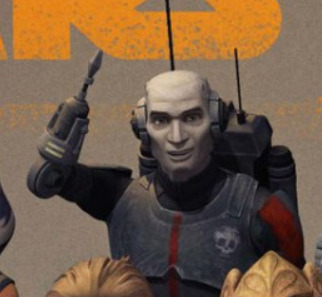
hi
#🥺#i miss him#ngl this poster kinda weirds me out lol#seeing phee next to dooku just what huh??#why does zeb have his arm around hunter? why is tech chatting with a tac droid???#why is jar jar touching rex he looks so uncomfortable lol leave him alone#and where's fives!!#but my guy is here front and center waving his lil scomp 🥺#and he's smiling!#look at him!#ughh#arc trooper echo#tbb#sw tcw
59 notes
·
View notes
Text
As a queer trans person, I often find myself being stared at and asked uncomfortably invasive questions. That's why this pride month, I'm partnering with The Magnus Institu
#next time a cis person asks me a weird question about my sex life we're Beholding them#it's only happened once but like it was a 60yo man and i was in high school#to be fair he was in my precalc class at the community college so I'm sure he assumed i was older but not THAT much older#uncomfortable nonetheless#tma#the magnus archives#the beholding
1K notes
·
View notes
Text
thru Moirai Shenaniganery, Odysseus is sent thousands of years back in Time to the early stages of The Titanomachy, forcibly Deified and radiating with enough power to potentially rip a Fate-Changing hole into Greeces current state,,
However, he wants absolutely no part of the current events due to the staggering amount of ways things could get worse if he decided to involve himself, so The Former King goes into hiding alongside the ancient Cult of The Ôriginal Pan :3
,,,unfortunately, despite Fate not having it’s Personifications yet, they still manage to fuck up Odysseus’s lay low plan when he comes face to face with a young Poseidon, retreating from a battlefield, and taking a covered detour thru woods near The Cult’s current hiding spot,,,,,,
,,,aaaaaaaand then young! Dondon develops the hots 4 Ody’, deeply admiring this handsome, older stranger taking care of & guiding those around to him :) younger Zeus also catches The Feels bc yes
#epic the musical#epic fandom#greek mythology#bullshit to keep me going ♾️✨#greek gods#slight shitpost#epic odysseus#epic poseidon#epic pan#epic zeus#God! Odysseus#Epic Moirai#fic ideas#crack fic idea#time travel#Awkward crushes#As in its awkward for Ody’#Titanomachy era#Young flushed Zeus going up to God! Ody’ trying to convince him to join The Olympians side so he can have a better shot at The Shadow Deity#-and about 6 of Odysseus’s brain cells fucking die on the spot at how uncomfortable & weird this whole situation is + trying to gently-#-explain to the big hopeful puppy dog eyes the young Sky God is giving him that he doesn’t want to be involved with the war 😭😭#Onesided in this case#odyseidon#odysseus x poseidon#Shadow of Nobody eyed by Everybody A.U#odysseus x zeus
78 notes
·
View notes
Text





While Isaiah and Pandora were talking inside, Fawn and Ash were chatting outside so they wouldn't interrupt them. It was clear Fawn felt uncomfortable, but after a quick introduction (where Ash made it clear she wasn’t Pandora’s girlfriend) and a few jokes, they really hit it off 🥳

#ts4 gameplay#ts4 challenge#ts4 legacy challenge#ts4 screenshots#Fawn was super uncomfortable and Ash started making jokes#and it was so cute of her that I had to add it to the story 🥺#At first it was just going to be Fawn Pandora and Isaiah#but Ash showed up unannounced and I thought it was going to be weird?#But she made sure everyone had a good time 😭 love you Ash#btw Fawn asked about Pandora and Ash said she was “a really good friend” rude 😔#pollock legacy#gen6#ashlyn byers by doodle-dee#fawn dellis by mdshh#They shared the sushi with Fawn and Ash I swear LMAO!!
108 notes
·
View notes
Text
Ever since the tariffs went through there has been a massive uptick in ads telling us to “buy canadian” (which I agree, don’t get me wrong) and I feel like I’m going kind of insane because it’s reminding me A LOT of war propaganda with all it’s witty nationalist taglines, “elbows up” “it’s time to stand” “keep your money in canada, for canada” I feel like they’re gonna tell me to buy war bonds and to grow a victory garden in order to help punch hitler in the face
#all the brands are emphasizing how canadian they are#ads are reminding us to check labels and stuff#A PIZZA PLACE HAS TARIFF DISCOUNTS GIRL 😭#my mom and my brother keep sending this patriotic memes and I’m like ‘is no one else finding this really jarring????’#like I am all for fucking over america ESPECIALLY trump#but it’s just making me slightly… uncomfortable? idk if that’s the right word#idk it’s just so weird I’ve only ever seen stuff like this in history books lmao#*image of trudeau pointing at the viewer* we want YOU to buy canadian!#<- I fear the day I will see this#anyways#I don’t mean to get political(?) but I can’t keep quiet about this anymore I feel like I’m losing it
69 notes
·
View notes